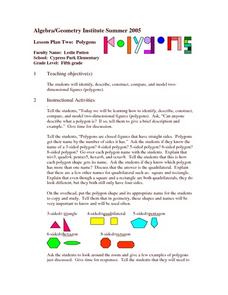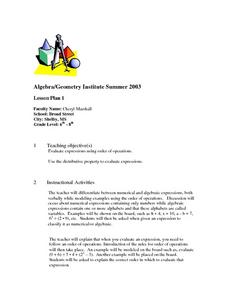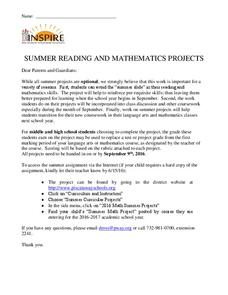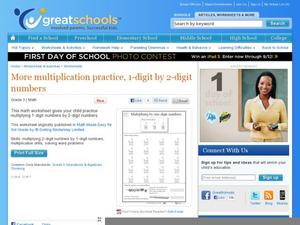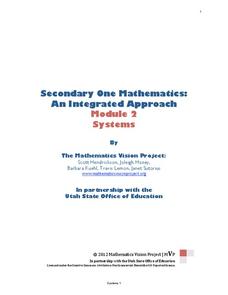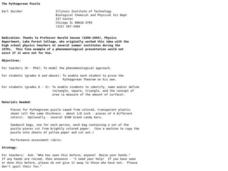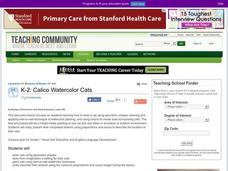Curated OER
Use Models to Compare and Order Integers
Learners investigate the concept of integers and how they should occur in the realm of irrational numbers. The activity includes the use of positive and negative integers. The activity is a good foundation in order to move into...
Curated OER
Inequalities and The Order of Operations
Middle and high schoolers investigate how to solve inequalities. The activity has a good guide for taking pupils through a direct instruction of the concept. You can use counting tiles in order to help kinesthetic learners.
Curated OER
Whole Numbers
A game is a great way to learn. Study what makes an integers, their traits, and characteristics. This lesson includes 3 separate activities intended to promote an understanding of integers, whole numbers, and opposites. The class is...
Curated OER
Ordering Integers
Sixth and seventh graders compare and order integers. After locating integers in a newspaper, they describe examples of negative and positive integers. They draw a thermometer and locate positive and negative integers on the scale. In...
Curated OER
Order Numbers On a Number Line
Fifth and sixth graders study the use of a number line to add integers and they observe a teacher demonstration of how to add integers on a number line. Afterward, they construct a number line and use the number line to solve addition...
Curated OER
Lesson Plan Two: Polygons
Learners explore the concept of polygons on a two-dimensional plane. They identify polygons in everyday life and draw different polygons according to their classification. Using a geoboard and geobands, they consrtuct polygons and even...
Curated OER
The Distributive Property
Young scholars use a visual to introduce the Distributive Property. The lesson is chronologically numbered and follows a distinct plan. The class works with the teacher to complete the lesson. The plan is not written in a traditional...
Curated OER
Evaluating Using The Order of Operations
Scholars are introduced to the usage of the Order of Operations. They explore the use of variables and how they are represented by any letter of the alphabet. They then engage in discussion for verbal assessment.
Curated OER
Data With Candy
Young scholars, while utilizing the classroom and the computer lab with a bag of colored candy, gather and interpret data, calculate averages and draw conclusions and draw a bar graph. They estimate how many candies are in the bag, what...
Curated OER
Math is Beautiful: Tessellation
Learners examine patterning in Chinese and Japanese artwork prior to creating their
own tessellations using styrofoam plates in this creative cross-curricular instructional activity for upper-elementary/middle level classrooms.
Curated OER
Fun In The Sun Questionnaire
In this summer fun questions instructional activity, students answer a set of 8 questions about their summer and bring to school on the first day to complete a graphing activity.
Curated OER
Beat the Heat: Meander Through These Books
A hazy, daisy, lazy summer reading list for math (and interdisciplinary) learning.
Curated OER
Dog Lot Math
Students use their problem-solving skills to answer math problems. They determine the cost of feeding sled dogs. They share their answers with the class.
Piscataway Township Schools
Bake Sale
Here is a project that instructs young bakers to calculate the ingredients needed for a cookie bake sale. The catch is that the ingredients for 32 cookies is given; however, pupils must figure out the amounts needed for 12 and 60...
Curated OER
Multiples of 6 #2
Count by six with these helpful activities. After completing number sequences and multiplication problems from the six times table, third graders solve problems that are written out at the bottom of the page. An excellent way to work on...
DK Publishing
Subtraction Practice #3
Reinforce subtraction skills with twenty problems, all subtracting two-digit numbers from three-digit numbers. An additional five problems at the end of the page include decimals to the hundredth place. Great as a homework assignment or...
DK Publishing
More Multiplication Practice, 1-Digit by 2-Digit Numbers
When multiplying two-digit numbers by one-digit numbers, use a guided set of problems like this one. There are three examples for young mathematicians to reference, and they solve 20 equations. They are required to regroup for some....
Curated OER
Place Value for Decimals
Are your fourth graders having problems with decimals? Help them identify the place value of various numbers. Here, they describe what happens to the value of different numbers, as well as select numbers with given values in the tenths...
Curated OER
Clowning Around: Drawing
Kids create a clown out of shapes. They work to show emotions while practicing their drawing skills. Pupils use circles, triangles, squares, oil pastels, and their imagination to draw, color, and decorate a sad or happy clown. Tip: Have...
Mathematics Vision Project
Module 2: Systems of Equations and Inequalities
The brother-sister pair Carlos and Clarita need your class's help in developing their new pet sitting business. Through a variety of scenarios and concerns presented to the siblings, the learners thoroughly explore systems of equations...
Curated OER
The Pythagorean Puzzle
An engaging hands-on activity is presented. Learners of all ages are addressed in thie unique plan. K-5 learners identify, name, and define a rectangle, square, triangle, and the concept of area. Older learners prove the Pythagorean...
Curated OER
Exploration of "Pillbugs"
Fifth graders define vocabulary terms, identify the characteristics of a pillbug, and create a dichotomous key. Then they examine the pillbugs and make observations and record these observations. Finally, 5th graders observe specific...
Curated OER
Calico Watercolor Cats
A fun art project, this lesson plan incorporates math and listening skills as young artists play with a new painting technique. First the teacher models how to draw a cat using shapes, an oval for the body, triangles for the ears and so...
Curated OER
The Golden Ratio
Seventh graders investigate a ratio found in nature and in numerous pieces of artwork throughout history. The lesson is cross-curricular and builds a sense of appreciation of design for students.







